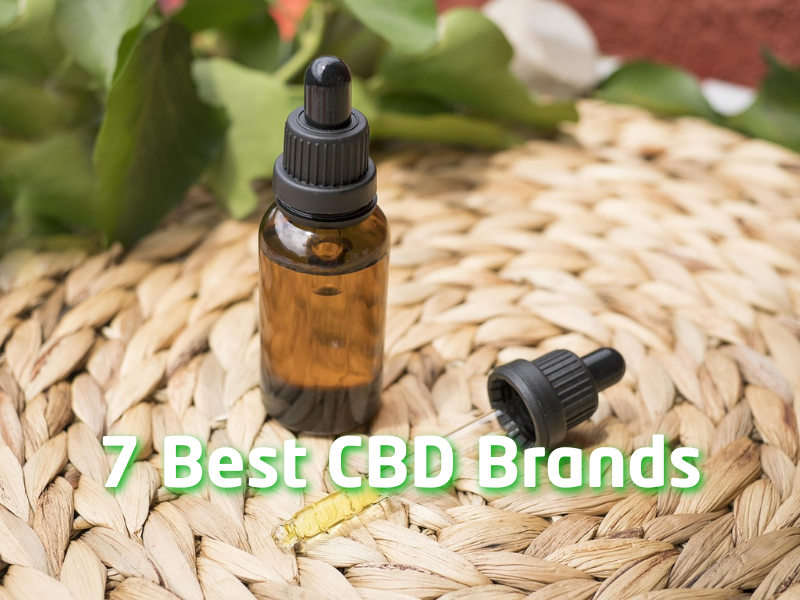CBD Oil has transcended its niche status to become a global wellness phenomenon, captivating millions with its promise of natural relief without the psychoactive effects commonly associated with cannabis. Derived from the cannabis Sativa plant, cannabidiol (CBD) is one of over a hundred identified cannabinoids, each with unique properties.
Unlike delta-9-tetrahydrocannabinol (THC), the compound responsible for the “high,” CBD Oil offers a path to relaxation and balance, making it an appealing option for those seeking holistic well-being. This extensive guide aims to provide a definitive resource on CBD Oil, exploring its scientific foundations, diverse applications, proper usage, safety considerations, and the evolving landscape of this burgeoning industry.
[Disclosure: This post contains affiliate links. We may earn a commission if you make a purchase through these links, at no extra cost to you.]
Understanding CBD Oil: Beyond the Buzz and into the Botany
To truly grasp what CBD Oil is, it’s essential to distinguish it from other cannabis compounds and understand its source. The cannabis plant is incredibly complex, producing a wide array of compounds, including cannabinoids, terpenes, and flavonoids. While THC is the most famous for its intoxicating effects, CBD Oil is valued precisely because it doesn’t produce a high. This non-intoxicating nature is a primary reason for its widespread acceptance and burgeoning research.
Historically, cannabis has been used for millennia across various cultures for medicinal, spiritual, and recreational purposes. Ancient texts from China, India, and Egypt document the use of cannabis for pain, inflammation, and digestive issues. While these ancient uses likely involved the whole plant, the modern understanding and isolation of compounds like CBD are relatively recent. In the 1940s, American chemist Roger Adams successfully isolated CBD, but it wasn’t until the 1960s that Dr. Raphael Mechoulam detailed its chemical structure. The past decade, however, has witnessed an explosion of interest and research, propelling CBD Oil into the mainstream.
The source of CBD Oil is also critical. It can be extracted from both marijuana and hemp plants. Legally, CBD Oil derived from hemp (defined as cannabis with less than 0.3% THC by dry weight) is federally legal in many countries, including the United States, thanks to the 2018 Farm Bill. This distinction is vital for consumers, ensuring compliance with local laws and avoiding unintended psychoactive effects.
The market for CBD Oil products is vast and ever-expanding, offering an array of consumption methods. From traditional tinctures and versatile capsules to palatable edibles, soothing topicals, and rapid-acting vape products, there’s a CBD Oil solution for nearly every preference and lifestyle. This accessibility allows individuals to seamlessly integrate CBD Oil into their daily routines, whether it’s a few drops under the tongue for systemic support, a topical cream for targeted relief, or a gummy for a convenient and enjoyable experience. However, navigating this diverse market requires informed choices, which we will elaborate on later.
The Intricate Science Behind CBD Oil: How It Interacts with Your Body’s Endocannabinoid System
The secret behind CBD Oil‘s diverse effects lies in its remarkable interaction with the human body’s endocannabinoid system (ECS). Discovered in the late 1980s and early 1990s, the ECS is a crucial biological system present in all mammals, playing a fundamental role in maintaining homeostasis – the body’s internal balance. The ECS consists of three main components:
- Endocannabinoids: These are naturally produced cannabinoid-like molecules (e.g., anandamide and 2-arachidonoylglycerol, or 2-AG) that act as neurotransmitters, sending messages throughout the body.
- Cannabinoid Receptors: Primarily CB1 and CB2 receptors, these are found throughout the brain, central nervous system, peripheral nervous system, immune cells, organs, and connective tissues. CB1 receptors are more abundant in the brain and central nervous system, influencing mood, memory, and pain perception, while CB2 receptors are mainly found in the peripheral nervous system and immune cells, affecting inflammation and pain.
- Enzymes: These enzymes (e.g., FAAH and MAGL) break down endocannabinoids after they have fulfilled their function.
Unlike THC, which directly binds to and activates CB1 receptors (leading to its psychoactive effects), CBD Oil‘s interaction with the ECS is more subtle and indirect. Instead of binding directly to CB1 or CB2 receptors, CBD influences them in a more modulatory way. For instance, CBD Oil is thought to inhibit the enzyme FAAH, which is responsible for breaking down anandamide, often referred to as the “bliss molecule.” By slowing down this breakdown, CBD Oil allows anandamide to remain in the system for longer, potentially enhancing its positive effects on mood and well-being.
Furthermore, CBD Oil interacts with other non-cannabinoid receptors and pathways in the body. It can engage with serotonin 5-HT1A receptors, which are involved in regulating mood, anxiety, and sleep. This interaction is a key factor in explaining why CBD Oil is often associated with anxiolytic (anxiety-reducing) and antidepressant-like effects. CBD Oil also influences Transient Receptor Potential (TRP) channels, specifically TRPV1, which are known to mediate pain perception and inflammation. This broad-spectrum engagement with various physiological systems contributes to the wide range of potential therapeutic benefits attributed to CBD Oil.
The ongoing scientific research is continuously revealing the intricate mechanisms by which CBD Oil exerts its effects. Studies are increasingly shedding light on its potential to reduce neuroinflammation, modulate immune responses, and protect neurological function, positioning CBD Oil as a promising compound for a variety of health conditions.
The Potential Health Benefits of CBD Oil: What Emerging Research and Anecdotal Evidence Suggest
The therapeutic potential of CBD Oil is a subject of extensive research, and while more large-scale human clinical trials are needed, existing studies and a growing body of anecdotal evidence highlight several promising areas.
- Anxiety and Stress Relief: This is arguably one of the most common reasons individuals turn to CBD Oil. Pre-clinical studies and some human trials suggest that CBD Oil may help reduce anxiety in various contexts, including generalized anxiety disorder, social anxiety disorder, and even PTSD. Its interaction with serotonin receptors is believed to play a significant role here, promoting a sense of calm and well-being. Many users report that CBD Oil helps “take the edge off” daily stressors, allowing them to feel more composed and resilient.
Many individuals find that full-spectrum CBD Oil is particularly effective for managing stress and anxiety due to the ‘entourage effect.’ We’ve had great experiences with NuLeaf Naturals for its calming properties - Pain Management and Anti-inflammatory Properties: Chronic pain affects millions globally, and CBD Oil is gaining traction as a natural alternative or adjunct to conventional pain medications. Research indicates that CBD Oil possesses potent anti-inflammatory properties, which can be beneficial in alleviating pain stemming from various sources, including neuropathic pain, inflammatory conditions like arthritis, and muscle soreness. Its ability to interact with the ECS and TRPV1 receptors is thought to contribute to its analgesic effects. For athletes, in particular, CBD Oil is increasingly used for post-workout recovery, helping to reduce inflammation and muscle soreness, allowing for faster recuperation and improved performance. The World Anti-Doping Agency (WADA) removed CBD from its list of prohibited substances in 2018, opening the door for athletes to safely explore its benefits.
- Epilepsy Treatment: One of the most compelling and scientifically validated applications of CBD Oil is in the treatment of certain rare forms of epilepsy, specifically Lennox-Gastaut syndrome and Dravet syndrome. The U.S. Food and Drug Administration (FDA) approved Epidiolex, a pharmaceutical-grade CBD Oil product, in 2018 for these conditions. This approval represents a significant milestone, underscoring the undeniable therapeutic efficacy of CBD.
- Neuroprotective Potential: Emerging research suggests that CBD Oil may have neuroprotective properties, potentially benefiting conditions like Parkinson’s disease, Alzheimer’s disease, and multiple sclerosis. While this area of research is still nascent, the anti-inflammatory and antioxidant effects of CBD Oil are of great interest to scientists exploring ways to protect brain health.
- Sleep Improvement: Many individuals struggle with sleep disturbances, and CBD Oil is often explored as a natural sleep aid. While it may not directly induce sleep like a sedative, its ability to reduce anxiety and pain, which are common disruptors of sleep, can indirectly lead to improved sleep quality and duration. By promoting a more relaxed state, CBD Oil can help users fall asleep more easily and experience more restful sleep.
- Skin Health and Topical Applications: The anti-inflammatory and antioxidant properties of CBD Oil also extend to skincare. It’s increasingly being incorporated into topical products like creams, balms, and serums to address various skin conditions, including acne, psoriasis, and eczema. CBD Oil can help calm inflamed skin, reduce redness, and regulate oil production, contributing to a healthier complexion.
CBD Oil Consumption Methods: Finding Your Ideal Fit
The versatility of CBD Oil extends to its numerous consumption methods, each offering distinct advantages in terms of onset time, duration of effects, and bioavailability (the proportion of CBD that enters the circulation when introduced into the body).
- Sublingual (Under the Tongue) Consumption: This is one of the most popular and effective methods for CBD Oil. Tinctures, which are liquid extracts, are typically administered by placing drops under the tongue. The thin mucous membranes in the mouth allow for rapid absorption of CBD directly into the bloodstream, bypassing the digestive system and liver. This results in a relatively fast onset of effects (typically 15-45 minutes) and good bioavailability (around 13-35%). Users hold the CBD Oil under their tongue for 60-90 seconds before swallowing.
For those seeking rapid absorption, CBD Oil tinctures are a popular choice. We often recommend brands like Nuleaf Naturals for their purity and effectiveness, or if you’re looking for an organic, full-spectrum option. - Oral Ingestion (Capsules and Edibles): CBD Oil infused into capsules, gummies, chocolates, and beverages offers a convenient and discreet way to consume CBD. These products need to pass through the digestive system and be metabolized by the liver before entering the bloodstream. This process, known as the “first-pass effect,” significantly reduces the bioavailability of CBD (typically 4-20%), meaning a larger dose may be needed to achieve the desired effect. The onset of effects is slower (30 minutes to 2 hours or more), but the effects tend to last longer (4-8 hours).
- Topical Application: CBD Oil topicals, such as creams, balms, lotions, and salves, are designed for localized relief. When applied to the skin, CBD interacts with cannabinoid receptors in the skin, muscles, and joints, without entering the bloodstream in significant amounts. This method is ideal for targeting specific areas of pain, inflammation, or skin conditions. Onset time can vary (20-60 minutes), and effects are localized to the application area. Bioavailability is generally low for systemic effects but high for localized action.
- Inhalation (Vaping): Vaping CBD Oil involves heating a CBD liquid or concentrate to produce a vapor that is inhaled into the lungs. The lungs offer a vast surface area for absorption, allowing CBD to enter the bloodstream almost immediately, bypassing the digestive system and liver. This method offers the highest bioavailability (up to 56%) and the fastest onset of effects (within minutes), making it suitable for acute relief. However, the long-term health implications of vaping are still being studied, and it may not be suitable for everyone.
- Rectal Administration: Though less common, CBD Oil suppositories can be an effective method, particularly for localized issues in the pelvic area or for individuals who cannot ingest CBD orally. This method offers relatively high bioavailability (8-50%) and a faster onset than oral methods, as it also bypasses the first-pass metabolism.
When choosing a CBD Oil consumption method, consider your desired onset of effects, the duration of relief needed, and your personal preferences. Starting with a low dose and gradually increasing it is a universally recommended practice, regardless of the method chosen.
The Role of Terpenes and the Entourage Effect in CBD Oil
Beyond CBD itself, full-spectrum and broad-spectrum CBD Oil products contain other beneficial compounds found in the cannabis plant, most notably terpenes and flavonoids. Terpenes are aromatic compounds that give plants their distinct scents and flavors. In cannabis, they contribute to the plant’s aroma profile and are believed to offer their own therapeutic properties.
The “entourage effect” is a synergistic hypothesis suggesting that all the compounds in the cannabis plant—cannabinoids, terpenes, and flavonoids—work together in harmony to produce a more profound and comprehensive therapeutic effect than any single compound could on its own. While the science behind the entourage effect is still evolving, many advocates believe that full-spectrum CBD Oil, which contains a wide array of these compounds, is more effective than CBD isolate (pure CBD).
Some common terpenes found in CBD Oil and their potential benefits include:
- Myrcene: Often found in mangoes, hops, and thyme, myrcene is known for its earthy, musky aroma. It’s believed to have sedative, anti-inflammatory, and analgesic properties, potentially enhancing the “couch-lock” effect in some cannabis strains.
- Limonene: With a strong citrus scent, limonene is found in citrus rinds. It’s thought to have mood-elevating, stress-relieving, and anti-fungal properties.
- Beta-Caryophyllene: This peppery, spicy terpene is unique because it’s the only terpene known to directly interact with CB2 receptors, giving it anti-inflammatory and analgesic potential. It’s also found in black pepper and cloves.
- Linalool: Present in lavender, linalool has a floral, spicy aroma. It’s associated with calming, sedative, and anti-anxiety effects.
- Pinene: As its name suggests, pinene has a pine-like aroma and is found in pine needles. It’s believed to have anti-inflammatory, bronchodilator, and memory-enhancing properties.
Understanding these additional compounds helps consumers make more informed choices about the type of CBD Oil best suited for their needs.
Safety and Side Effects of CBD Oil: What Consumers Should Know
While CBD Oil is generally considered safe and well-tolerated, it’s crucial for consumers to be aware of potential side effects and interactions, particularly when using it in conjunction with other medications. Most side effects are mild and temporary.
Common side effects associated with CBD Oil can include:
- Drowsiness or Sedation: Especially at higher doses, CBD Oil can induce a sense of calm that may lead to drowsiness. This can be beneficial for sleep but might be undesirable during the day.
- Dry Mouth: Often referred to as “cottonmouth,” this is a common side effect, though usually mild.
- Changes in Appetite: Some users report slight changes in appetite, either an increase or decrease.
- Diarrhea or Upset Stomach: Less common, but some individuals may experience mild gastrointestinal upset.
A more significant concern is the potential for CBD Oil to interact with certain medications. CBD is metabolized by cytochrome P450 enzymes in the liver. Many common medications, including blood thinners (like warfarin), some antidepressants, anti-seizure medications, and certain immunosuppressants, are also metabolized by these enzymes. CBD Oil can inhibit the activity of these enzymes, potentially leading to higher-than-intended levels of other medications in the bloodstream, increasing their effects or side effects. This is why it is absolutely critical to consult with a healthcare professional before starting CBD Oil, especially if you are taking any prescription medications. They can assess potential interactions and guide you on appropriate dosing or adjustments to your current medication regimen.
Furthermore, while CBD Oil is non-addictive, ensuring you’re using high-quality products from reputable sources is paramount for safety. The unregulated nature of the market has led to instances of mislabeled products, inaccurate CBD content, and contamination.
Navigating the CBD Oil Market: Tips for Buying High-Quality Products
The rapidly expanding CBD Oil market can be a minefield for consumers. To ensure you’re purchasing a safe, effective, and high-quality product, follow these essential guidelines:
- Prioritize Third-Party Lab Testing: This is perhaps the most critical factor. Reputable CBD Oil companies send their products to independent, accredited third-party laboratories for testing. These labs verify the CBD and THC content, ensuring it matches what’s stated on the label, and test for contaminants.
- Certificate of Analysis (CoA): Always look for a readily available CoA for each product batch. This document should detail the cannabinoid profile, potency, and confirm the absence of pesticides, heavy metals (like lead, mercury, cadmium, and arsenic), residual solvents (from the extraction process), and microbial contaminants (mold, yeast, bacteria). Transparency here is key.
To ensure you’re getting a high-quality CBD Oil product, always look for third-party lab reports. Some of our top-rated brands known for their transparent testing include Nuleaf Naturals, our top choice, Charlotte’s Web and Cornbread Hemp. For more choices, visit our article on 7 Best Cbd Brands To Alleviate Pain And Suffering
- Certificate of Analysis (CoA): Always look for a readily available CoA for each product batch. This document should detail the cannabinoid profile, potency, and confirm the absence of pesticides, heavy metals (like lead, mercury, cadmium, and arsenic), residual solvents (from the extraction process), and microbial contaminants (mold, yeast, bacteria). Transparency here is key.
- Understand Extraction Methods: The method used to extract CBD Oil from the cannabis plant impacts the purity and quality of the final product.
- CO2 Extraction: This is considered the “gold standard” for CBD Oil extraction. It uses supercritical CO2 to separate CBD and other compounds from the plant material, resulting in a clean, pure, and solvent-free extract.
- Ethanol Extraction: This method uses ethanol as a solvent to extract cannabinoids and terpenes. While effective, it requires careful post-processing to ensure all alcohol is removed.
- Oil Extraction: This is a simpler method involving heating the plant material with a carrier oil (like olive oil). While safe, it produces a less concentrated CBD Oil and has a shorter shelf life.
- Check the Hemp Source: High-quality CBD Oil starts with high-quality hemp. Look for brands that source their hemp from reputable farms, ideally those that follow organic farming practices. Hemp is a bioaccumulator, meaning it readily absorbs compounds from the soil, including toxins. Therefore, knowing the origin and farming practices is crucial.
- Read Product Labels Carefully: Pay attention to the type of CBD Oil (full-spectrum, broad-spectrum, or isolate), the total CBD content in milligrams (mg), and the suggested serving size.
- Full-Spectrum CBD Oil: Contains all naturally occurring compounds of the hemp plant, including CBD, minor cannabinoids, terpenes, and up to 0.3% THC. This allows for the “entourage effect.”
- Broad-Spectrum CBD Oil: Contains CBD and other cannabinoids and terpenes, but the THC has been removed or is undetectable. This is a good option for those who want the entourage effect without any THC.
- CBD Isolate: Pure CBD, with all other plant compounds removed. It contains 0% THC. While effective, it lacks the potential benefits of the entourage effect.
- Be Wary of Unsubstantiated Claims: If a brand promises “miracle cures” or makes medical claims that seem too good to be true, proceed with caution. CBD Oil is a supplement and wellness product, not a magic bullet.
- Seek Customer Reviews and Brand Reputation: Research the brand’s reputation and read customer reviews. While anecdotal, consistent positive feedback can indicate a trustworthy company and effective products. Look for companies with strong customer service and educational resources.
Curated for You: The Best CBD Oil Products We Trust
After extensive research and personal experience, we’ve identified a few top-tier CBD Oil brands that consistently meet our high standards for quality, transparency, and effectiveness. We’ve selected options catering to different needs and preferences.

NuLeaf naturals
CBD Oil For Overall Wellness
- NuLeaf Naturals Full Spectrum CBD Oil:
- NuLeaf Naturals is our top pick because of its unwavering commitment to quality and purity. The USDA Certified Organic hemp, grown in Colorado, gives us immense confidence in its source. Their seed-to-shelf control and advanced CO2 extraction methods ensure a clean, potent product.
The fact that it’s full-spectrum is crucial for me; we want the benefit of the “entourage effect” where all the cannabinoids, terpenes, and flavonoids work together for enhanced therapeutic benefits. Plus, using organic virgin hemp seed oil as a carrier aligns with our preference for natural, beneficial ingredients.
- NuLeaf Naturals is our top pick because of its unwavering commitment to quality and purity. The USDA Certified Organic hemp, grown in Colorado, gives us immense confidence in its source. Their seed-to-shelf control and advanced CO2 extraction methods ensure a clean, potent product.
I’d primarily use this for overall wellness, general anxiety reduction, and potential support for mild aches or inflammation. Its higher potency options are also appealing for when more significant support is needed.
Specific Use Case: Daily wellness, general anxiety, chronic mild pain, post-workout recovery.

Cornbread Hemp
Natural Restoration
- Cornbread Hemp Whole Flower USDA Organic Full Spectrum CBD Oil:
- Cornbread Hemp stands out for its USDA organic certification and its emphasis on “whole flower” extraction. This means they’re utilizing the entire hemp flower, which is rich in cannabinoids and terpenes, potentially leading to a more robust entourage effect. Their commitment to less than 0.3% THC (as a full-spectrum product) is standard but important for compliance.
Like NuLeaf, the organic certification is a huge trust factor. The focus on the “whole flower” suggests a very comprehensive extract, which is appealing for maximum potential benefits.
- Cornbread Hemp stands out for its USDA organic certification and its emphasis on “whole flower” extraction. This means they’re utilizing the entire hemp flower, which is rich in cannabinoids and terpenes, potentially leading to a more robust entourage effect. Their commitment to less than 0.3% THC (as a full-spectrum product) is standard but important for compliance.
Specific Use Case: Deeper relaxation, more pronounced calming effects for higher stress periods, potentially for more persistent pain or sleep difficulties where the full plant profile is desired.
Take advantage of Cornbread Hemp’s Discount Programs for military and veterans, first responders and government workers, teachers, government assistance, healthcare workers, and students!

joy organics
For Pure Organic Bliss
- Joy Organics Broad Spectrum CBD Oil or high-quality CBD Isolate if zero THC is the absolute priority:
- Why: For someone who needs to avoid THC entirely (e.g., due to drug testing at work, or personal preference against any THC, however trace), Joy Organics’ Broad Spectrum CBD Oil would be my go-to. They are known for their high-quality, organic hemp, and their broad-spectrum products undergo thorough processing to remove detectable THC while retaining other beneficial cannabinoids and terpenes. This provides a “THC-free” experience (as certified by lab reports) while still allowing for a somewhat lesser version of the entourage effect.
Specific Use Case: Managing anxiety/stress, pain, or sleep issues with absolute zero THC concerns, but still wanting more than just pure CBD. If even broad spectrum isn’t enough (e.g., allergic to other cannabinoids, or wanting only CBD), then a CBD Isolate from a reputable brand would be the choice for 99%+ pure CBD.

charlotte’s web
For The Legacy
- Charlotte’s Web Full Spectrum CBD Oil:
- For someone seeking a historically trusted brand with proven efficacy and a robust, full-spectrum experience, Charlotte’s Web would be our next top choice. While NuLeaf Naturals is also full-spectrum and organic, Charlotte’s Web offers a unique value proposition through its pioneering legacy and proprietary hemp genetics.
Their original formula, especially, is known for its darker, richer profile due to their alcohol extraction method, which some users find delivers a more profound “entourage effect” compared to CO2-extracted oils. It’s ideal for those who value brand heritage, extensive R&D in hemp genetics, and a slightly different full-spectrum profile that some find more effective for certain conditions.
- For someone seeking a historically trusted brand with proven efficacy and a robust, full-spectrum experience, Charlotte’s Web would be our next top choice. While NuLeaf Naturals is also full-spectrum and organic, Charlotte’s Web offers a unique value proposition through its pioneering legacy and proprietary hemp genetics.
Specific Use Case: For individuals prioritizing a well-established, “legacy” brand with a track record, seeking a potent full-spectrum effect (including trace THC) for consistent daily wellness, or addressing persistent stress, anxiety, or sleep issues, especially when they prefer a richer, more complex cannabinoid and terpene profile that the alcohol-extracted formulas can offer.
Our choices lean heavily towards full-spectrum products (or excellent broad-spectrum if THC is a hard no) from USDA Certified Organic brands that emphasize transparency, third-party testing, and clean extraction methods. These factors are paramount for effective and safe CBD use in our personal health and wellness journeys.
Take The CJ Quiz:
Common Questions and Answers
Q1: What is CBD Oil, and how does it differ from THC?
A1: As discussed in “Understanding CBD Oil: Beyond the Buzz,” CBD Oil contains cannabidiol (CBD), a compound from the cannabis plant. Unlike THC, which causes intoxicating effects, CBD is non-intoxicating and is valued for its potential to offer relaxation and balance without altering your mind.
Q2: How does CBD Oil work with the body’s natural systems?
A2: Our section “The Intricate Science Behind CBD Oil” explains that CBD Oil primarily interacts with your body’s endocannabinoid system (ECS). Instead of directly binding to receptors like THC, it subtly influences the ECS to help maintain homeostasis (internal balance), and also engages with other systems like serotonin receptors, which may contribute to its effects on mood and anxiety.
Q3: What are some of the potential health benefits of CBD Oil, according to research?
A3: As detailed in “The Potential Health Benefits of CBD Oil,” emerging research suggests CBD Oil may help with:
- Anxiety and stress relief
- Pain management due to its anti-inflammatory properties
- Certain forms of epilepsy (like those treated by FDA-approved Epidiolex)
- Improved sleep quality by addressing underlying pain or anxiety
- Support for skin health in topical applications.
Q4: What are the common methods for consuming CBD Oil, and how do they differ in effect?
A4: The “CBD Oil Consumption Methods” section outlines various ways to take CBD Oil:
- Sublingual (tinctures): Placed under the tongue for rapid absorption into the bloodstream (fast onset).
- Oral (capsules, edibles): Ingested and metabolized through digestion (slower onset, longer duration).
- Topical (creams, balms): Applied to the skin for localized relief (localized effects).
- Inhalation (vaping): Inhaled for immediate effects (fastest onset, shorter duration). Each method has different onset times and durations of effect, impacting bioavailability.
Q5: What are the typical side effects of CBD Oil, and can it interact with medications?
A5: Our “Safety and Side Effects” section highlights that CBD Oil is generally well-tolerated, but common side effects can include drowsiness, dry mouth, or upset stomach. Critically, CBD Oil can interact with certain medications by affecting liver enzymes, potentially altering drug levels in the bloodstream. Always consult a healthcare professional if you are taking other medications.
Q6: What should I look for to buy high-quality CBD Oil?
A6: The “Navigating the CBD Oil Market” section provides key tips:
- Third-Party Lab Testing: Always check for a Certificate of Analysis (CoA) to verify potency and purity.
- Hemp Source: Look for reputable farms that use organic practices.
- Extraction Methods: CO2 extraction is often preferred for purity.
- Clear Labeling: Understand if it’s full-spectrum, broad-spectrum, or isolate.
- Brand Reputation: Choose transparent and trustworthy companies.
Q7: What are CB1 and CB2 receptors?
A7: CB1 and CB2 receptors are the two main types of cannabinoid receptors, which are part of the endocannabinoid system (ECS) in the body.
- CB1 receptors are predominantly found in the central nervous system (brain and spinal cord) and regulate functions like pain, mood, memory, and appetite.
- CB2 receptors are mainly located in the peripheral nervous system, especially in immune cells, and play a key role in modulating inflammation and immune responses.
The Future of CBD Oil: Trends, Innovations, and Evolving Regulations
The CBD Oil market is dynamic and poised for continued growth and innovation. Industry experts predict significant expansion, with personalized products, regulatory clarity, and sustainable practices leading the way.
- Personalized CBD Oil Products: Driven by advancements in AI and data analytics, the future of CBD Oil will likely see more personalized products tailored to individual needs and genetic profiles. This could involve customized cannabinoid and terpene ratios, microdosing guidance, and targeted formulations for specific conditions like sleep, focus, or post-athletic recovery.
- Regulatory Clarity and Standardization: As of 2025, regulatory bodies like the FDA in the U.S. and similar agencies in Europe are actively working towards establishing clearer guidelines for CBD Oil products, particularly in food, beverages, and dietary supplements. This increased oversight will lead to greater product standardization, enhanced consumer protection, and likely more stringent quality control, ultimately building greater trust in the industry.
- Sustainability and Ethical Sourcing: Consumers are increasingly demanding environmentally friendly and ethically produced products. The CBD Oil industry is responding with a focus on sustainable farming practices, regenerative agriculture, eco-friendly packaging, and transparent supply chains, from seed to sale.
- Expansion into New Markets: Beyond traditional wellness, CBD Oil is expanding into diverse sectors. The pet CBD market is booming, with growing interest in natural remedies for animal anxiety, pain, and inflammation. The beauty and cosmetics industry is also heavily integrating CBD Oil for its anti-inflammatory and antioxidant properties. Furthermore, CBD Oil beverages and functional foods are becoming more prevalent, offering novel and enjoyable consumption experiences.
- Advanced Delivery Methods: Innovation in delivery science is leading to more effective and bioavailable CBD Oil products. Expect to see more nanotechnology emulsions, liposomal formulations, and other advanced delivery systems designed to enhance absorption and improve therapeutic efficacy.
- Continued Research and Clinical Trials: The scientific community’s interest in CBD Oil remains strong. More rigorous clinical trials are underway to further elucidate its mechanisms of action and validate its efficacy for a wider range of medical conditions. This ongoing research will continue to inform product development and regulatory frameworks.
In conclusion, CBD Oil represents a fascinating intersection of ancient botanical wisdom and modern scientific inquiry. As research progresses and regulations evolve, its role in promoting holistic health and well-being is set to become even more clearly defined. By staying informed about the latest developments and making educated purchasing decisions, consumers can confidently explore the potential of CBD Oil to enhance their quality of life.

